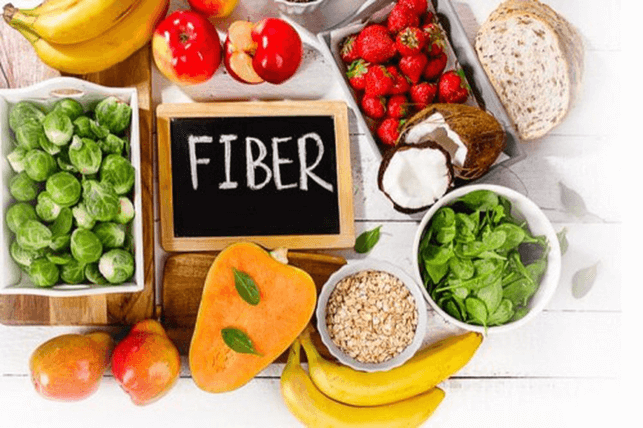What is fiber? How does fiber help us in weight loss? Let’s find out more details through the article below.
Definitions and classifications
Fiber is one kind of carbohydrate. It is sometimes called roughage or bulk. Fiber is the part of plant foods that our bodies do not break down during digestion. Fiber is important for keeping the digestive tract working smoothly.
Because fiber isn’t digested, it doesn’t give us calories. Foods that contain a lot of fiber may also contain other types of carbohydrates like starch or sugar. While we do not get calories from the fiber in these foods, we do get calories from the sugars and starches they contain.
When we eat cellulose or the fiber of plants and vegetables, we cannot digest it. Cellulose is also a polysaccharide consisting of thousands of similar glucose linked together; unlike glycogen and starch, it is linked by beta bonds. Cellulose is very stable – it is used to make cell envelopes and most of the support structures in green plants. Humans do not have enzymes to break beta bonds. However, ruminants like cows and horses, along with termites, have enzymes to break beta bonds so they can get energy from grasses and woods.

What is fiber (Source: vinmec)
There are two main types of fiber: soluble and insoluble. Soluble fiber dissolves in water, and insoluble fiber does not. Americans on average eat more insoluble than soluble fiber.
How does fiber help in weight loss?
1. Keep your digestive system healthy
+ Soluble fiber, found in flaxseeds, fruits, and vegetables, becomes gel in the water, thus helping to hydrate stool; This allows it to pass through the intestines smoothly, reducing constipation.
+ Insoluble fiber includes kale, spinach, nuts, bran, and whole grains. Amaranth, Kamut, millet, and quinoa contain high levels of fiber, which can be substituted for wheat. Insoluble fiber gives bulk to the stool; this makes stools solid but soft to move easily through the digestive tract.

Fiber – Best way to Keep Your Digestive System Healthy (Source: fashionforswag)
2. Reduce cravings – how fiber help in weight loss
Soluble fiber can reduce appetite and increase satiety. Because fiber is not fully digested and it’s dissolvable in water, the foods turn thick and slurry, thus slowing absorption in the small intestine. As a result, you feel fuller, and can eat less. One study found that intake reduced by 11 percent by 11% by adding a type of soluble fiber to the diet.

Reduce cravings – how fiber help in weight loss (Source: ndtv)
3. Produce short-chain fatty acids and prebiotics
The soluble fiber in fruits and vegetables dissolves in water but is not fully digested. They are fermented in the intestine to produce short-chain fatty acids and prebiotics, which may have many health benefits in weight management.
+ Prebiotics promote the growth of normal bacteria living inside the colon by providing nutrients. Approximately one hundred trillion bacteria, ten times the total number of cells in the adult human body, are colonized inside the human intestine.
+ Short-chain fatty acids produced by soluble fiber have been shown to improve mineral and nutrient absorption, strengthen our immune system, and even reduce the risk of colon cancer.
4. Lower Your Insulin Levels
The part of fruits and vegetables that cannot be digested will be food for bacteria to thrive. Using glucose from fiber will lower insulin levels, this is how fiber helps in weight loss. We know that gut bacteria even help maintain healthy body weight levels in children.
>>> Related Posts
Function of insulin in the body (3 main functions)
5 foods to avoid during weight loss – Which food is the worst?
Habits that make you lose weight effectively (6 natural habits)
10 weight loss myths 2022 – Reasons people fail at weight loss
>>> References
Thinsulin – the breakthrough solution to help you lose weight and stay thin – Charles T.Nguyen